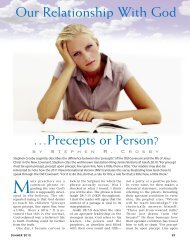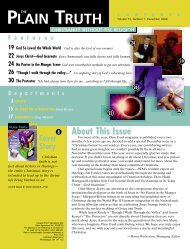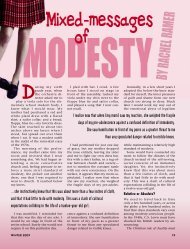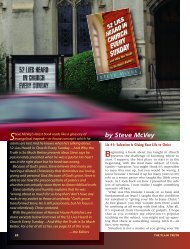Jesus and the Stone Throwers - Plain Truth Ministries
Jesus and the Stone Throwers - Plain Truth Ministries
Jesus and the Stone Throwers - Plain Truth Ministries
Create successful ePaper yourself
Turn your PDF publications into a flip-book with our unique Google optimized e-Paper software.
that would be an interesting story!<br />
Upon bringing <strong>the</strong> woman to <strong>Jesus</strong>,<br />
<strong>the</strong> Pharisees were quick to quote<br />
<strong>the</strong> law of Moses, which required<br />
that <strong>the</strong> woman be stoned to<br />
death. The Pharisees were zealous<br />
to cite <strong>the</strong> rules because law—not<br />
love—was <strong>the</strong> driving force of<br />
<strong>the</strong>ir religion.<br />
The Pharisees wanted to hear<br />
what <strong>Jesus</strong> had to say about <strong>the</strong><br />
matter, hoping <strong>the</strong>y might find a<br />
way to trick him. <strong>Jesus</strong> was not<br />
one, however, to be easily led into<br />
a legalistic quagmire. Ra<strong>the</strong>r than<br />
immediately address <strong>the</strong> issue,<br />
<strong>Jesus</strong> merely scribbled in <strong>the</strong> s<strong>and</strong><br />
with his finger. When his antagonists<br />
pressed <strong>the</strong> point, however,<br />
<strong>Jesus</strong> stood up <strong>and</strong> said, “If any<br />
one of you is without sin, let him<br />
be <strong>the</strong> first to throw a stone at<br />
her.” Silenced by a response that<br />
had clearly outmaneuvered <strong>the</strong>m,<br />
<strong>the</strong> Pharisees <strong>and</strong> teachers of <strong>the</strong><br />
law walked away, one-by-one.<br />
Finally, only <strong>Jesus</strong> was left, with<br />
<strong>the</strong> woman st<strong>and</strong>ing before him.<br />
He asked, “‘Woman, where are<br />
<strong>the</strong>y Has no one condemned<br />
At this point, I must<br />
ask myself what I<br />
would do in a<br />
similar situation. As<br />
a heterosexual<br />
male, if an<br />
attractive woman<br />
were cast down at<br />
my feet, I probably<br />
would not think of<br />
stoning her!<br />
you’ She replied, ‘No one, sir.’”<br />
Then <strong>Jesus</strong> said, “Then nei<strong>the</strong>r do I<br />
condemn you. Go now <strong>and</strong> leave<br />
your life of sin” (John 8:10-12).<br />
This event was briefly portrayed<br />
in Mel Gibson’s film, The Passion of<br />
<strong>the</strong> Christ. In <strong>the</strong> movie, a beautiful<br />
young woman—her dark, long<br />
hair loosed around her shoulders—<br />
is cast roughly to <strong>the</strong> ground before<br />
<strong>Jesus</strong>. Pushing herself up with<br />
her slender, delicate fingers, she<br />
looks up apprehensively at <strong>the</strong><br />
young rabbi, eyeing him through<br />
<strong>the</strong> dark waves falling provocatively<br />
across her face.<br />
At this point, I must ask myself<br />
what I would do in a similar situation.<br />
As a heterosexual male, if an<br />
attractive woman were cast down<br />
at my feet, I probably would not<br />
think of stoning her! In fact, I<br />
might find it easy to be compassionate<br />
<strong>and</strong> nonjudgmental.<br />
A Different Sin<br />
What if <strong>the</strong> story had a completely<br />
different twist, however After all,<br />
adultery is not <strong>the</strong> only sin from<br />
which <strong>Jesus</strong> came to save us. How<br />
would I react if <strong>the</strong> person cast<br />
down before me was a practicing<br />
homosexual, caught in <strong>the</strong> act<br />
with one of his many partners<br />
Would I find it easy to be noncondemning<br />
I mention homosexuality,<br />
not because it is a worse sin than<br />
adultery, but because evangelicals<br />
rail against it with such unrelenting<br />
energy—in fairness, some may<br />
say that part of <strong>the</strong> consistent<br />
rhetoric about homosexuality is in<br />
response to <strong>the</strong> belligerent attitude<br />
of militant gays.<br />
We Christians are sometimes<br />
highly selective in our righteous<br />
indignation. Gay activists have<br />
fairly criticized Christians for our<br />
double-st<strong>and</strong>ard on family values.<br />
Although we persistently, <strong>and</strong><br />
rightly, decry <strong>the</strong> homosexual<br />
lifestyle <strong>and</strong> its threat to <strong>the</strong> traditional<br />
family, we evangelicals are<br />
just as likely to divorce as nonbelievers.<br />
Moreover, having served many<br />
years as a family counselor in a<br />
large evangelical megachurch, I<br />
assure you that extramarital sex is<br />
common enough among us. Please<br />
underst<strong>and</strong>—I am not endorsing a<br />
homosexual lifestyle. Not only do<br />
I find <strong>the</strong> behavior distasteful; I<br />
believe it is sinful. Yet should we<br />
be more judgmental toward a<br />
particular act because we find it<br />
personally distasteful while we<br />
overlook, or even justify, our own<br />
sinful behaviors<br />
We make much of <strong>the</strong> fact that<br />
<strong>the</strong> apostle Paul states emphatically<br />
that homosexual offenders will<br />
not inherit <strong>the</strong> kingdom of God<br />
(1 Corinthians 6:9). Yet we fail<br />
to note that in <strong>the</strong> same passage,<br />
Paul also says that <strong>the</strong> sexually<br />
immoral—not to mention idolaters,<br />
adulterers, thieves, <strong>the</strong><br />
greedy, drunkards, sl<strong>and</strong>erers <strong>and</strong><br />
swindlers—will not inherit <strong>the</strong><br />
kingdom of God. Probably many<br />
of us, at least occasionally, can find<br />
What if <strong>the</strong> story<br />
had a completely<br />
different twist<br />
...How would I react<br />
if <strong>the</strong> person cast<br />
down before me was<br />
a practicing<br />
homosexual,<br />
caught in <strong>the</strong> act<br />
with one of his<br />
many partners<br />
a place to fit in one or more of<br />
<strong>the</strong>se categories.<br />
To bring <strong>the</strong> matter closer to<br />
home, what would we do if a practicing<br />
homosexual came to our<br />
church How many of us would<br />
rise in righteous indignation to<br />
condemn such a person How<br />
many would sit near that person or<br />
shake his h<strong>and</strong> after <strong>the</strong> service<br />
We often forget that, in <strong>the</strong><br />
words of <strong>the</strong> great fourth-century<br />
Christian thinker Augustine, <strong>the</strong><br />
church is not as much a society of<br />
saints as a hospital for sinners.<br />
Moreover, <strong>Jesus</strong> taught us that it is<br />
not <strong>the</strong> healthy who need a doctor,<br />
but <strong>the</strong> sick.<br />
He did not come to call those<br />
who, like <strong>the</strong> Pharisees, think <strong>the</strong>y<br />
are righteous <strong>and</strong>, <strong>the</strong>refore, see no<br />
need of God’s saving grace. He<br />
came to call sinners to repentance<br />
(Luke 5:31-32).<br />
A Spiritual Hospital<br />
Dispensing Grace<br />
I once attended a small ga<strong>the</strong>ring<br />
of pastors <strong>and</strong> counselors where I<br />
had <strong>the</strong> privilege of hearing a talk<br />
by <strong>the</strong> late, great preacher, E.V.<br />
Hill. Pastor Hill made it clear that<br />
he was a Bible-believing Christian.<br />
NOVEMBER/DECEMBER 2005 7
















